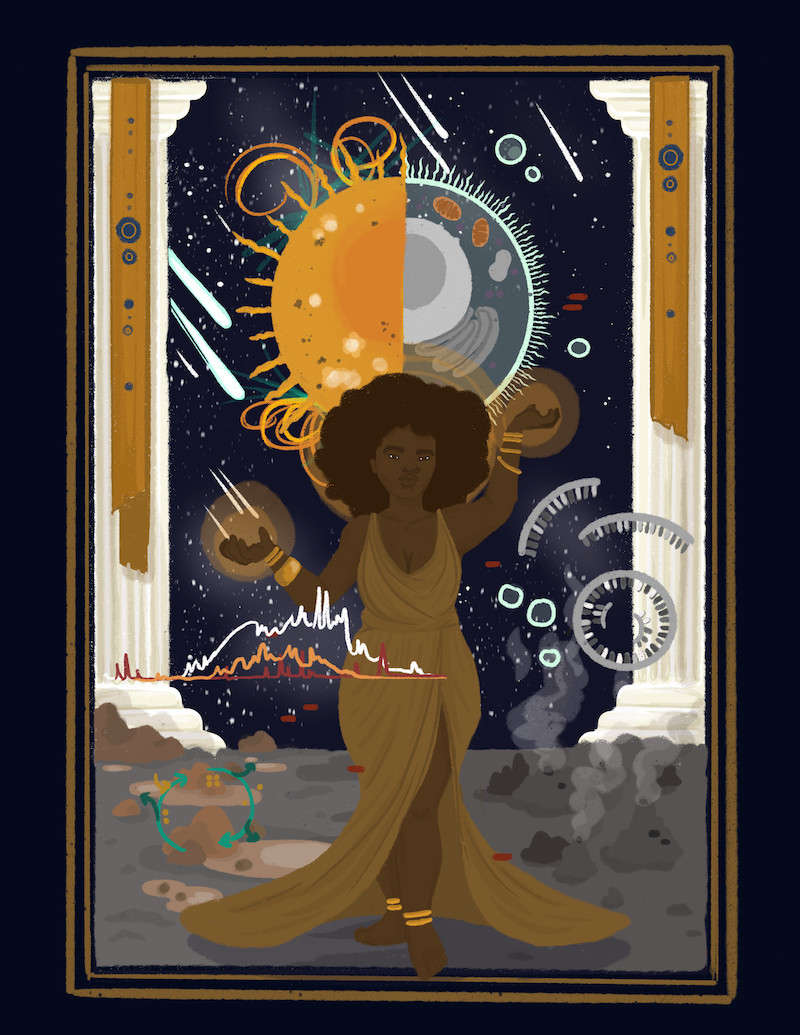
Illustration by Cecilia Sanders for Caltech Letters
Viewpoint articles are a vehicle for members of the Caltech community to express their opinions on issues surrounding the interface of science and society. The views expressed here do not necessarily reflect the views of Caltech or the editorial board of Caltech Letters. Please see our disclaimer.
If you want to build a ship, don’t herd people together to collect wood, and don’t assign them tasks and work. Instead, teach them to long for the endless immensity of the sea.
—Antoine de Saint-Exupéry, “Wisdom of the Sands”
I saw the best minds of my generation destroyed by madness…
—Allen Ginsberg, “Howl”
For a short time when I was six years old, I was really into rocks. Armed with a notepad, ruler, and magnifying glass, I’d march to the neighborhood park to catalog its geology in as much detail as possible. I still remember the rush of excitement that came each time I “discovered” a new stone, like no one had ever set eyes on it before. It was the first time I ever felt like a scientist.
That kind of wondrous, wide-eyed exploration is the reason I decided to pursue research in the first place, albeit more recently as a biology student (my passion for pebbles has since subsided). This is the realm of what we call “basic” science, which is termed for its focus on curiosity-driven discovery rather than any inherent simplicity. Yet the closer I get to becoming a card-carrying academic, the more I’m forced to ask myself whether my motivations should be more pragmatic. We urgently need to solve real-world problems, from global pandemics to climate change. Why bother developing abstract theories when we could spend that effort creating new medicines? Even if those theories later prove to be prerequisites that yield practical dividends, getting there by curiosity alone seems slower, riskier, more circuitous, and harder to control.
This debate is as old as science itself—and yet I can’t help but feel suspicious of those who deride basic research as foolishly romantic. I’m reminded of the apocryphal story about Michael Faraday who, when challenged by an audience member to justify the value of some discovery, retorted: “Madam, what is the use of a newborn child?” Clearly, it would be ridiculous to judge a person’s future potential based solely on their defenselessness as an infant. Similarly, when science aggressively optimizes for immediate utility above all else, it risks missing a wealth of mysteries we have yet to understand or even conceive. How much is a fact really worth? What’s the going rate for a flash of insight, a new model in biophysics, or an entire branch of mathematics? Why did Newton invent calculus, Darwin follow finches, and Einstein ponder gravity? The most impactful advances in human history were born of curiosity alone. And while their initial value is difficult to formulate in dollars and cents, their ensuing practical ramifications have revolutionized our lives. “People cannot foresee the future well enough to predict what’s going to develop from basic research,” says George Smoot, a 2006 Nobel Laureate in Physics. “If we only did applied research, we would still be making better spears.”
On its own, applied research is a fundamentally myopic endeavor. We cannot see the future, and we will never know the answers to our questions unless we ask them first. We’ll never know which new discoveries will be made—or how, or when—until we find them, lurking at the edges of our perception, and yank them into the light. This is the reality of our existence, as inescapable as death, or entropy, or taxes. It’s the reason science must always be a defender of curiosity-driven inquiry.
Nonetheless, today’s academia leaves less room for basic science than ever before. Only 17% of total U.S. R&D expenditure is devoted to basic research—and while universities performed 58% of it in 2007, that proportion has since dropped to just 48% in 2017. Even federal support for basic research has stagnated over the past decade (in absolute dollars), as reviewers and funding agencies become increasingly risk-averse. Taxpayers and policymakers bristle at the idea of underwriting esoteric research without obvious practical impact. Scientists, forced to devote a growing portion of their time to chasing vital grants, are incentivized to pursue the kinds of projects that are more likely to be funded: low-risk proposals with clear, short-term results. Together, these forces leave curiosity-driven science in a quiet crisis. Society demands progress, but in the words of Lewis Thomas, “we’d like to pay less for it and get our money’s worth on some more orderly, businesslike schedule.”

A breakdown of federal R&D funding from 2000-2017. While the U.S. government remains the single largest backer of science, it no longer bankrolls the majority of basic research. Since this graphic was published, federal support for applied research has surpassed that of basic science (in absolute dollars).
The State of U.S. Science and Engineering 2020 (NCSES report).
The resulting trickle-down effects are pernicious. In a country where just 3.6% of total R&D funding reaches universities, competition for those research dollars is intense. Tacitly or overtly, trainees are encouraged to frame, upsell, and twist their research into the most “fundable” version possible. In the life sciences—which account for more than half of all academic research expenditure—it is a common practice to contort grant proposals until they offer some tenuous translational relevance, so that they might be considered by the monolithic National Institutes of Health. Even if a basic project is funded to completion, it can be an entirely different battle to publish the findings. Peer review at the most prestigious journals—Cell, Nature, and Science—emphasizes groundbreaking results with broad applicability, which naturally incentivizes authors to play up the importance of their work. Those who publish successfully in “high impact” journals bring in more grant money, boosting their academic careers. Researchers unlucky enough to be interested in unfashionable questions have little recourse; when they fail to publish “well” or to obtain further funding, they are promptly ejected from the scientific establishment.
The system now favors those who can guarantee results rather than those with potentially path-breaking ideas that, by definition, cannot promise success… Many surprising discoveries, powerful research tools, and important medical benefits have arisen from efforts to decipher complex biological phenomena in model organisms. In a climate that discourages such work by emphasizing short-term goals, scientific progress will inevitably be slowed, and revolutionary findings will be deferred.
—Alberts et al., Rescuing US biomedical research from its systemic flaws
Despite these monumental pressures, pockets of resistance still exist. New communities are emerging with the goal of establishing alternative ecosystems outside of academia, where basic science can flourish. Alternative publishing platforms could help address the limitations and misaligned incentives of modern peer review. A growing number of private and philanthropic organizations are starting to invest in riskier, exploratory projects, which might help to pick up the slack as federal funding slows. These are all welcome efforts, but we also need fundamental reform—which is where trainees are uniquely equipped to fight back.
To my fellow graduate students: resist the deforming gaze of today’s academia, which compels the commodification of your innate curiosity. You have the freedom to direct your research; this is a unique privilege. Do work that fascinates you, even if you can’t justify its immediate utility. Share your passion with the world, instead of letting the world beat it out of you. Tell old friends and first dates about your work. Blog about it. Present it at conferences. You will feel pressure to defend your interests in terms of technological advancement or practical impact, but remember that your curiosity is always worth your time. Following it isn’t some recreational or ivory-towered pursuit; it’s the beating heart of what science is all about.
After all, basic science is the original science. Since our earliest sapient ancestors first gazed up at the stars in wonder, we have been fighting to make sense of the universe. In the same way, our childhood fixations—whether rocks, space, dinosaurs, or something else entirely—reveal that there is something universal about our desire to understand. This search for meaning has been the engine of progress for our species throughout history. Curiosity is humanity’s most valuable compass—we must protect it in order to protect our future.
Acknowledgements
Thanks to Skyler Ware for many rounds of thoughtful edits (and remarkable patience while I struggled to meet my deadlines); Cecilia Sanders for an incredible illustration that’s way out of my writing’s league; Niko McCarty, Alexey Guzey, Divesh Soni, and countless other friends for reading and critiquing my drafts; and the entire Caltech Letters team for helping bring this little piece to life.




